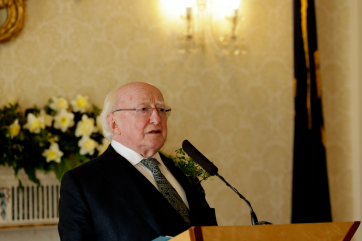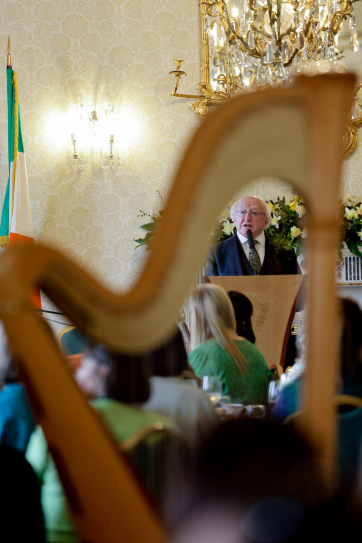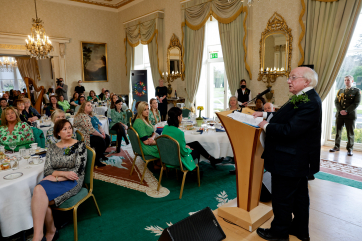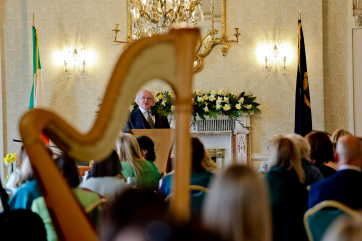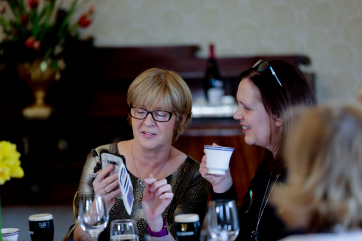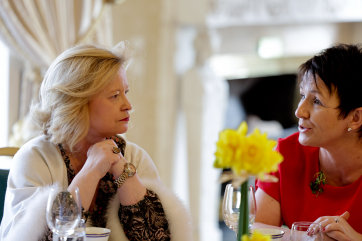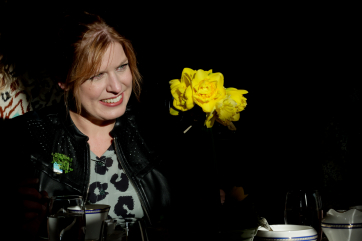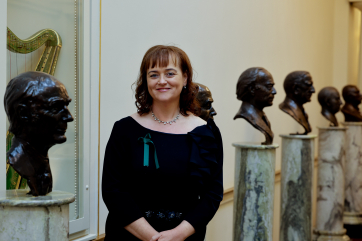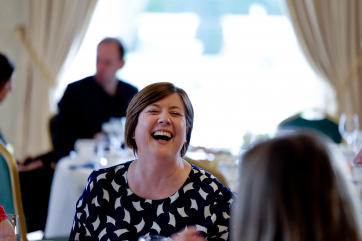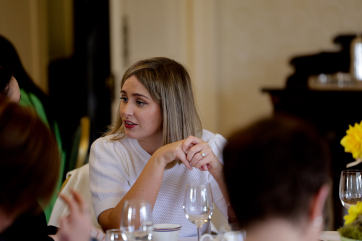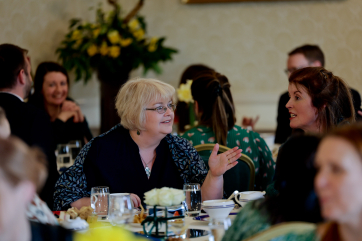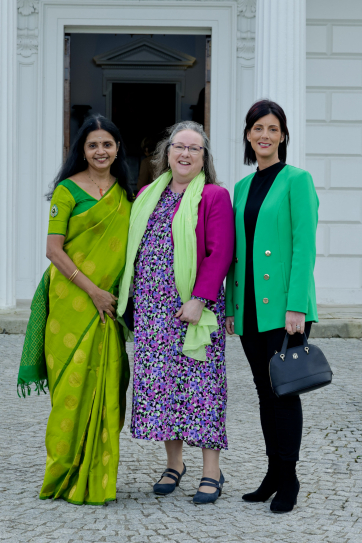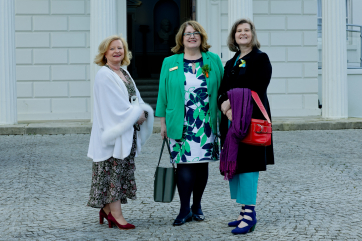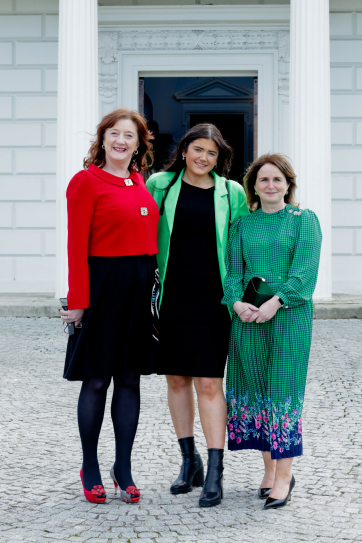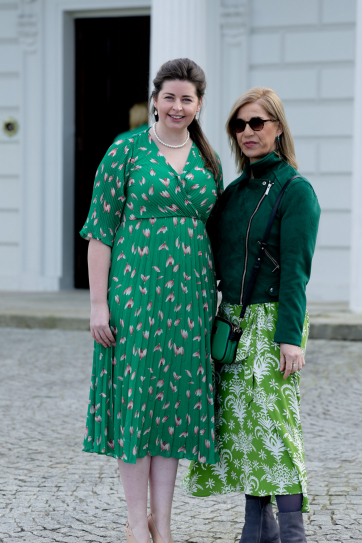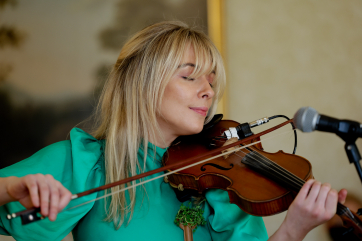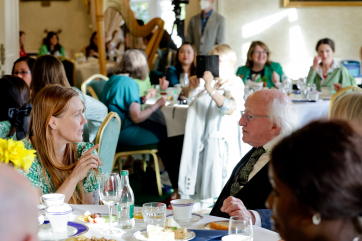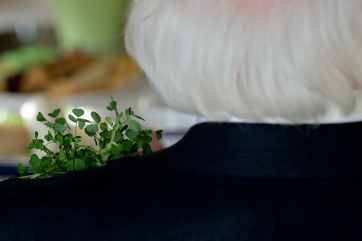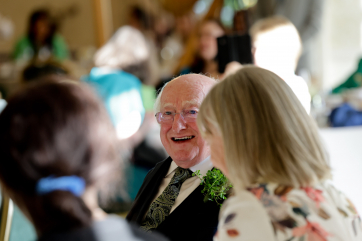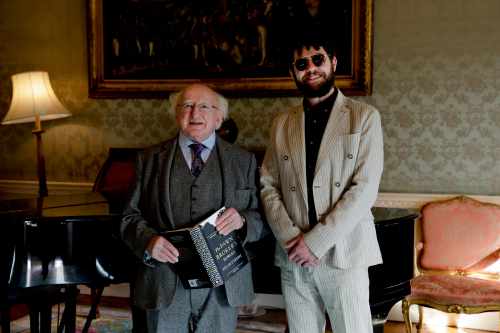Speech by President Michael D. Higgins at a Remembrance Ceremony for those Who Died from Covid-19, their Loved Ones and Frontline Workers
Áras an Uachtaráin, Sunday, 20th March, 2022
A cháirde,
Ar mo shon fhéin agus ar sonSaidhbhín fearaim fíor chaoin fáilte chroíúil romhaibh uilig go Áras an Uachtaráin inniu. Tá áthas orainn go bhfuil sibh linn ar an ócáid shollúnta, brónach, ach ceiliúrach seo. Táimid ag cúirt onoír agus déanfaimid cuimhneachán orthu siúd a chailleamar, iad siúd a chaill an deis do noimeád deiridh a ngaolta a roinnt, agus na mílta daoine nach raibh deis acu a bhrón a scaoileadh.
May Sabina and I welcome you all most warmly today to Áras an Uachtaráin to join with us for what is a solemn occasion at which we will give honour and hold in memory those we have lost, those who have suffered the absence of an opportunity for final moments shared, who could not release their grief.
Today, as we plant a memorial oak that will join the other symbolic pieces as to memory at Áras an Uachtaráin, we will reflect on the more than 6,600 people who died as a result of Covid-19 in this country over the past two years, their grieving families, and all those still suffering from Covid and its consequences. Our thoughts are with relatives of the more than 6 million who have died across the globe as a result of the virus.
The pandemic is still rampant in many parts of the world, particularly in poorer countries that have limited access to vaccines.
We must continue our efforts through the international institutions, such as the World Health Organisation, to support the roll-out of vaccinations in those countries with lower vaccination rates. As Secretary General of the United Nations António Guterres has reminded us repeatedly over the past 24 months, no-one is safe until everyone is safe.
Today we have to the forefront of our minds the more than half a million people in this country who lost loved ones during the pandemic, and all those, too, living abroad who have endured painful separation from loved ones at home in Ireland at times of great distress and grief. We recall how hard it was that there was no space for those normal expressions of grief that had to be curtailed because of the restrictions imposed, necessary as they were, to curtail the virus’s spread. We think too of those carers who had to forgo offering their care and visits to those they love.
Today’s ceremony is also for the purpose of expressing gratitude as we recall the many significant sacrifices that were made through all the significant family events that had to be deferred.
We cannot ever say it too often: today is a day in which we honour our frontline workers who ensured that our society and economy were able to function at a most basic level, providing essential services needed for subsistence, be it health or retail. All those workers, whatever the task, took risks to personal health. A heightened recognition now exists across society, I believe, regarding the need to value much essential work that we have been undervaluing and, may I say, in so many instances, underpaying.
Covid is not over. Many struggle on with the long-term effects of Covid-19, dealing with ongoing symptoms and fatigue which has become a debilitating side-effect of what has been termed ‘Long Covid’.
As we emerge from two brutal years of pandemic which have had such devastating consequences at so many levels – personal, societal, cultural and economic – we owe it to the victims of the pandemic, as well as those who risked their own health working in the provision of essential services, to take the opportunity that now presents itself to reflect and learn from the lessons that the pandemic provoked for us; questions pertaining to the world of work, how we valued and acknowledge different forms of work, but even more profoundly, questions relating to the way we strive to live our lives, the way we relate to our surroundings and with nature, our resonance with the world.
Sabina and I will shortly plant an oak tree in the Commemorative Garden here in Áras an Uachtaráin to remember all those we have lost to Covid-19.
Ag cuimhnuí inniu ar an dá bhliain atá thart is fuí dúinn go léir cinne a dhéanamh ár bpáirt a ghlacadh, agus bheith toiltineach tógáil ar fhoras na dlúthpháirtíochta, rud a léiríodh chomh soiléir sin le linn na paindéime. Is féidir linn an dlúthpháirtíocht sin a dhoimhniú, agus a leathnú. Is féidir linn dul i mbun dóchas a chruthú go díograsach agus todhchaí a chruthú atá níos athléimní, níos eiticiúla, níos cuimsithí agus níos inbhuanaithe i ndomhan iarphaindéimeach, domhan a chruthóidh ré nua de chearta uilíocha an duine agus a fheabhsóidh aontacht sóisialta. Bheadh toradh dá leithéid ina chomhartha chuí ómóis dóibh siúd ar fad a chuimhnímid orthu inniu.
[Today as we recall the past two years, may I urge us all to play our part in building on the groundswell of solidarity, so amply demonstrated during the pandemic, to deepen this solidarity, extend it ever further, set about creating hope and a future that is more resilient, ethical, inclusive and sustainable in a post-pandemic world, one that will usher in a new era of universal human rights and social cohesion. Such an outcome would perhaps be the most fitting tribute to all those we remember today.]
I will ring the Peace Bell. As I do so, the words of Leonard Cohen remind us of the importance of authenticity in both grief and hope:
“Ring the bells that still can ring
Forget your perfect offering
There is a crack, a crack in everything
That’s how the light gets in”.
Together let us give honour and hold in memory.

